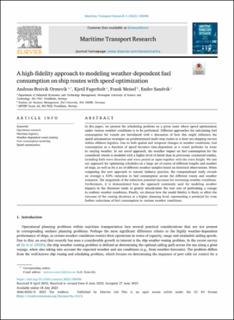| dc.contributor.author | Ormevik, Andreas Breivik | |
| dc.contributor.author | Fagerholt, Kjetil | |
| dc.contributor.author | Meisel, Frank | |
| dc.contributor.author | Sandvik, Endre | |
| dc.date.accessioned | 2023-09-11T11:35:35Z | |
| dc.date.available | 2023-09-11T11:35:35Z | |
| dc.date.created | 2023-08-25T14:49:53Z | |
| dc.date.issued | 2023 | |
| dc.identifier.citation | Maritime Transport Research. 2023, 5 . | en_US |
| dc.identifier.issn | 2666-822X | |
| dc.identifier.uri | https://hdl.handle.net/11250/3088646 | |
| dc.description.abstract | In this paper, we present the scheduling problem on a given route where speed optimization under various weather conditions is to be performed. Different approaches for calculating fuel consumption for vessels are introduced with a discussion of how this might influence the speed optimization strategies on predetermined multi-stop routes in a short sea shipping service within offshore logistics. Due to both spatial and temporal changes in weather conditions, fuel consumption as a function of speed becomes time-dependent as a vessel performs its route in varying weather. In our novel approach, the weather impact on fuel consumption for the considered vessels is modeled with a higher level of detail than in previously conducted studies, including both wave direction and wave period as input together with the wave height. We test our approach for optimizing schedules on a large set of routes of different lengths and number of stops, as well as for a set of different weather samples based on historical observations. When comparing the new approach to current industry practice, the computational study reveals on average a 4.5% reduction in fuel consumption across the different routes and weather scenarios. The magnitude of the reduction potential increases for worsening weather conditions. Furthermore, it is demonstrated how the approach commonly used for modeling weather impacts in the literature tends to greatly miscalculate the true cost of performing a voyage in realistic weather conditions. Finally, we discuss how the model fidelity is likely to affect the outcome of the routing decisions at a higher planning level, representing a potential for even further reductions of fuel consumption in various weather conditions. | en_US |
| dc.language.iso | eng | en_US |
| dc.publisher | Elsevier B. V. | en_US |
| dc.rights | Navngivelse 4.0 Internasjonal | * |
| dc.rights.uri | http://creativecommons.org/licenses/by/4.0/deed.no | * |
| dc.title | A high-fidelity approach to modeling weather-dependent fuel consumption on ship routes with speed optimization | en_US |
| dc.title.alternative | A high-fidelity approach to modeling weather-dependent fuel consumption on ship routes with speed optimization | en_US |
| dc.type | Peer reviewed | en_US |
| dc.type | Journal article | en_US |
| dc.description.version | publishedVersion | en_US |
| dc.source.pagenumber | 0 | en_US |
| dc.source.volume | 5 | en_US |
| dc.source.journal | Maritime Transport Research | en_US |
| dc.identifier.doi | 10.1016/j.martra.2023.100096 | |
| dc.identifier.cristin | 2169767 | |
| dc.source.articlenumber | 100096 | en_US |
| cristin.ispublished | true | |
| cristin.fulltext | original | |
| cristin.qualitycode | 1 | |

